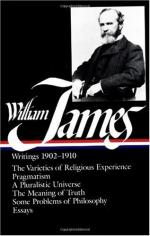|
This section contains 2,180 words (approx. 6 pages at 400 words per page) |

|
John Dewey
John Dewey was an American philosopher operating out of the University of Chicago. He was responsible for the foundation of the Chicago school which had a similar theoretical approach to Schiller in Oxford. Both schools were very much in line with James' Theory of Pragmatism. Dewey's conception of the truth was that ideas become true just in so far as they help us to get into satisfactory relationship with other parts of our experience. Truth is being able to link new experiences with old experiences in such a way as to have value in relationship to the world; in other words, this marriage or linking function, is known as instrumental truth.
Dewey suggested that this linking function is how people deal with novel experience and new opinions. He was subjected to a great deal of contempt and ridicule, and being similarly minded, James was called to defend...
|
This section contains 2,180 words (approx. 6 pages at 400 words per page) |

|




